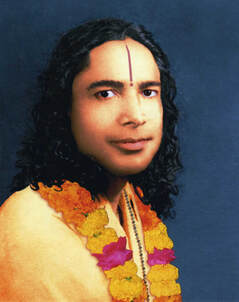Is Bhakti Eternal or Not?

Question:
The scriptures tell us that we earn spiritual merit by performing Bhakti or devotion and whatever spiritual merit we earn through performing devotion, lasts forever. It can never be taken away from us. On the flip side, we are also warned to be careful and not do anything that will result in us losing spiritual merit.
So, if spiritual merit can never be lost, why are we warned against losing it? Can you please help reconcile this contradiction?
Answer:
You are correct in your understanding that spiritual wealth is earned by practicing devotion or doing sadhana bhakti. Also, as in the world, they say "practice makes perfect", so it is in the spiritual domain. The more dedicated effort you expend in practicing devotion, the stronger and enhanced your devotional feelings become and your spiritual progress is strengthened.
Spiritual progress has two aspects: detachment of the mind from the matters of the material world and attachment to God. Both of these go hand in hand.
The scriptures tell us that we earn spiritual merit by performing Bhakti or devotion and whatever spiritual merit we earn through performing devotion, lasts forever. It can never be taken away from us. On the flip side, we are also warned to be careful and not do anything that will result in us losing spiritual merit.
So, if spiritual merit can never be lost, why are we warned against losing it? Can you please help reconcile this contradiction?
Answer:
You are correct in your understanding that spiritual wealth is earned by practicing devotion or doing sadhana bhakti. Also, as in the world, they say "practice makes perfect", so it is in the spiritual domain. The more dedicated effort you expend in practicing devotion, the stronger and enhanced your devotional feelings become and your spiritual progress is strengthened.
Spiritual progress has two aspects: detachment of the mind from the matters of the material world and attachment to God. Both of these go hand in hand.
There are three eternal entities - Brahma, Jeev, and Maya.
Knowingly or unknowingly every jeev, since beginning-less time has been in a constant pursuit of happiness. The desire to attain that happiness is so strong that jeev does not spare a single moment in pursuit of anything other than happiness.
Yet, jeev hasn't attained that happiness from this material world in uncountable lifetimes. That is why our quest continues. The alarming point to note is that despite our superior intellect, and our personal experience of not getting divine bliss from the material world, we are not willing to accept the fact that
- Jeev - all living beings including humans, birds, animals, trees, insects etc. fall in the category of Jeev (individual beings).
- Maya – the inert cosmic energy of God is called Maya. This entire world is the manifestation of Maya.
- Brahma-Supreme God is the ocean of unlimited happiness. He is the sole controller of Jeev and Maya.
Knowingly or unknowingly every jeev, since beginning-less time has been in a constant pursuit of happiness. The desire to attain that happiness is so strong that jeev does not spare a single moment in pursuit of anything other than happiness.
Yet, jeev hasn't attained that happiness from this material world in uncountable lifetimes. That is why our quest continues. The alarming point to note is that despite our superior intellect, and our personal experience of not getting divine bliss from the material world, we are not willing to accept the fact that
- the pure unadulterated bliss that we yearn for, can only be obtained by attaining God.
- Maya, the inert power of God is not capable of bestowing that sentient happiness. The temporary happiness that we experience by acquiring material objects is a mere illusion. Our scriptures state the true definition of happiness;
|
यो वै भूमा तत्सुखम्॥
yo vai bhūmā tatsukham॥ “That which is unbounded and everlasting is Happiness”. True bliss can never be over-powered by unhappiness, discontentment or sorrow.
The moment that one develops a faith in the words of the scriptures that God “is” happiness, becomes a life changing moment for the person. The seeker then commences devotional practice under the able guidance of a true saint (see Saint or Imposter) and through constant practice his devotion continues to grow. Devotion or Bhakti infuses knowledge (see gyan) of God and creates natural detachment (vairagya) from the material world. As one continues to progress on the path of devotion, both gyan and vairagya continue to grow in equal measure. |
 Mira Bai was casually introduced to God by her Grandmother
Mira Bai was casually introduced to God by her Grandmother
Once the practice of devotion reaches its maturity, the seeker crosses over from the successive stages of practice (sadhana bhakti and Bhav Bhakti) and attains perfect bhakti called Prema Bhakti. This is the stage of God realization. From this moment onward, the devotee is enlightened with the divine knowledge and his ignorance is eliminated forever. If however, a seeker of God dies before attaining perfection, the spiritual merit (detachment to the material world and attachment to God) he has gained during the course of performing devotion, is stored in his spiritual bank account and granted to him in equal measure in his next human birth, so he can start practicing devotion from the point that he left in his previous human birth.
There are many spiritual aspirants associated with Shri Maharaj Ji, some for a very brief span of time and others for much longer, but not all of them are at the same level of spiritual evolution. In many cases it is seen that a person who just joined satsang, goes way beyond someone who has been in satsang for much longer. That is because a lot depends on the devotees previous sanskars formed on the basis of devotion performed in the previous lifetimes. The number of years of association with a saint in this lifetime alone is not a perfect measure of the devotees spiritual standing. Take for example Meera Bai and Tulsi Das. Their introduction to God was by chance, but because of the earnings of their previous lifetimes, they attained God within that lifetime.
The contrary is also equally true. Even though God grants you your spiritual earnings from previous lifetimes in this lifetime, yet it is your actions in this lifetime that determine your spiritual growth or downfall. If you do not expend any effort in growing that earning and exercise your free-will to waste your time in material pursuits, Maya will do its job and draw you towards the world. You will not notice any spiritual progress. Instead, because of Kusang (See Beware of Kusang) you run the risk of falling down and this downfall may have a further cascading effect for several lifetimes.
There are many spiritual aspirants associated with Shri Maharaj Ji, some for a very brief span of time and others for much longer, but not all of them are at the same level of spiritual evolution. In many cases it is seen that a person who just joined satsang, goes way beyond someone who has been in satsang for much longer. That is because a lot depends on the devotees previous sanskars formed on the basis of devotion performed in the previous lifetimes. The number of years of association with a saint in this lifetime alone is not a perfect measure of the devotees spiritual standing. Take for example Meera Bai and Tulsi Das. Their introduction to God was by chance, but because of the earnings of their previous lifetimes, they attained God within that lifetime.
The contrary is also equally true. Even though God grants you your spiritual earnings from previous lifetimes in this lifetime, yet it is your actions in this lifetime that determine your spiritual growth or downfall. If you do not expend any effort in growing that earning and exercise your free-will to waste your time in material pursuits, Maya will do its job and draw you towards the world. You will not notice any spiritual progress. Instead, because of Kusang (See Beware of Kusang) you run the risk of falling down and this downfall may have a further cascading effect for several lifetimes.
 If you loose your keys to your treasures you cannot enjoy your hard earned wealth
If you loose your keys to your treasures you cannot enjoy your hard earned wealth
Another important point to note is spiritual transgression or Namapradh (see the article The Greatest Sin in Divya Sandesh). If the devotee is careless and offends a genuine saint, his downfall is inevitable, even though he may have been in the stage of Bhav Bhakti (the stage just before God realization). Such a devotee is bound to suffer for millions of lifetimes. Yet, despite suffering a spiritual downfall, the spiritual merit that he has earned based on devotion performed in previous lifetimes and this lifetime will remain intact. With the grace of the same saint, the same devotee can attain the original stage of devotion, but only after undergoing sufferings for their misdeeds, kusang and namapradh.
So, you must think of spiritual merit as your earnings / valuables safely secured in a lock-box in your bank. As long as you have the keys to the lock-box, you can access your valuables and enjoy their use. If however you lose the keys to the lock-box, you cannot enjoy your hard earned earnings until you find the keys.
Thus, it is true that one earns spiritual merit through constant spiritual practice and that merit stays forever, yet one runs the risk of losing access to that merit for an uncertain amount of time if one is negligent and careless.
So, you must think of spiritual merit as your earnings / valuables safely secured in a lock-box in your bank. As long as you have the keys to the lock-box, you can access your valuables and enjoy their use. If however you lose the keys to the lock-box, you cannot enjoy your hard earned earnings until you find the keys.
Thus, it is true that one earns spiritual merit through constant spiritual practice and that merit stays forever, yet one runs the risk of losing access to that merit for an uncertain amount of time if one is negligent and careless.
|
करो चिरकाल तक गोविंद राधे । सत्संग तो लाभ कछु हो बता दे ॥ ११०२२
किन्तु कुसंग ऐसा गोविंद राधे । क्षण भर का भी सर्वनाश करा दे ॥ ११०२३ Our mind may only receive a slight positive impact after a long association with Saints and God; whereas a momentary bad association is capable of causing cataclysmic spiritual downfall. - Radha Govind Geet
Jagadguru Shri Kripalu Ji Maharaj |







